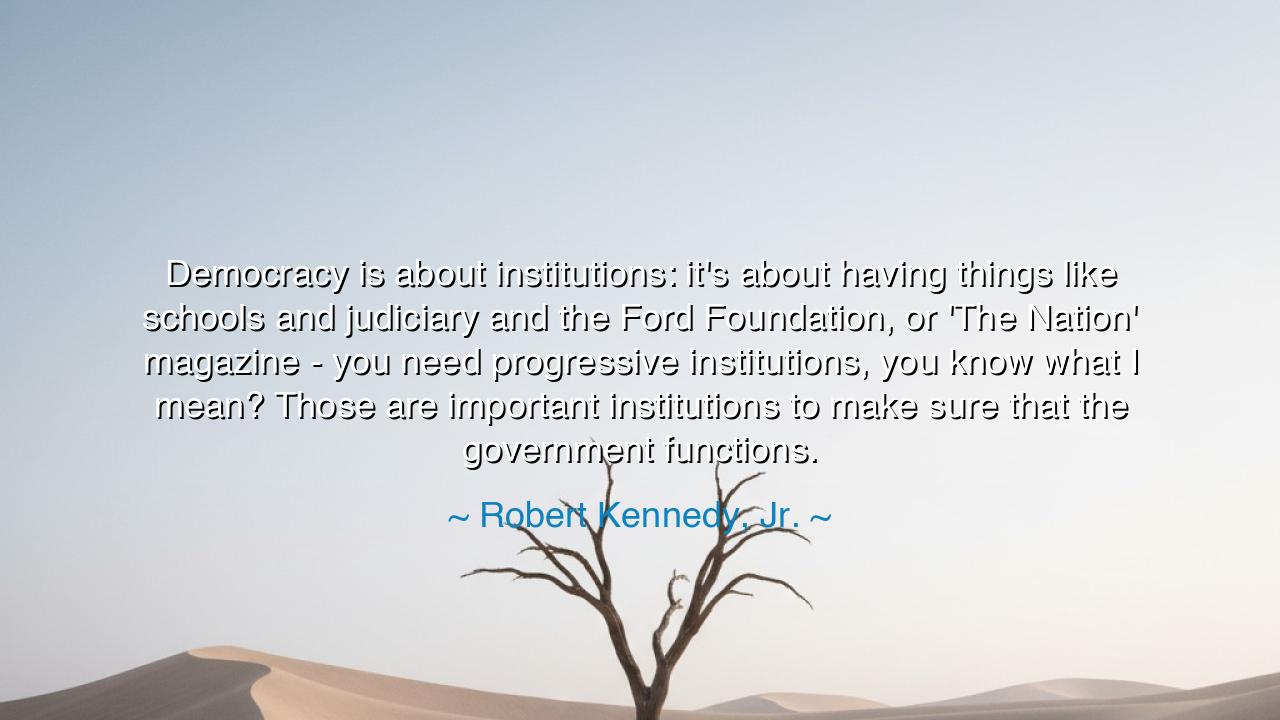
Democracy is about institutions: it's about having things like
Democracy is about institutions: it's about having things like schools and judiciary and the Ford Foundation, or 'The Nation' magazine - you need progressive institutions, you know what I mean? Those are important institutions to make sure that the government functions.






When Robert F. Kennedy, Jr. proclaimed, “Democracy is about institutions: it’s about having things like schools and judiciary and the Ford Foundation, or ‘The Nation’ magazine — you need progressive institutions, you know what I mean? Those are important institutions to make sure that the government functions,” he spoke not merely as a man of politics, but as a heir to a legacy of public conscience. His words resound with the gravity of a truth as old as civilization itself: that freedom is not self-sustaining. It lives and breathes only through the strength of the institutions that uphold it. Kennedy’s reflection is both a warning and a call to duty — a reminder that democracy without structure becomes chaos, and government without accountability becomes tyranny.
The origin of this quote emerges from Kennedy’s lifelong advocacy for justice, environmental protection, and public transparency. As the son and nephew of two of America’s most iconic leaders — Robert F. Kennedy and John F. Kennedy — he inherited a vision of governance rooted not in power, but in principle. When he spoke of “institutions,” he was pointing to the moral and civic framework that keeps democracy alive: schools that cultivate an informed citizenry; courts that defend the rule of law; media and foundations that question, challenge, and nurture progress. Kennedy understood that no government, however ideal in design, can survive without these pillars. They are the organs of democratic life, through which the heartbeat of liberty continues its rhythm.
In the style of the ancients, one might say Kennedy spoke in the tradition of Plato and Cicero, who warned that republics decay not from conquest, but from neglect. The ancients taught that freedom is not merely the right to vote, but the discipline to preserve virtue through education, justice, and civic participation. Kennedy’s institutions are the modern form of what the Greeks once called paideia — the shaping of citizens through learning and moral training. When these institutions are weakened, ignorance spreads like rust, corroding the very foundations of the state. Thus, Kennedy’s plea is not for political partisanship, but for spiritual vigilance — the cultivation of a society wise enough to protect its own soul.
History offers countless lessons on the truth of his warning. Consider the fall of the Weimar Republic in Germany. In the wake of World War I, democratic ideals flourished briefly, but the institutions that could have sustained them — the press, the judiciary, the universities — were undermined by corruption, polarization, and fear. Without strong schools to educate, or a strong judiciary to protect law over demagoguery, the people became vulnerable to tyranny. And so, through democratic means, they surrendered democracy itself to Adolf Hitler. Kennedy’s insight reminds us that when the structures of truth and justice crumble, even the noblest government can be devoured from within.
Yet his words are not cloaked in despair — they are filled with hopeful urgency. Kennedy believed that renewal was possible, that societies can rebuild their moral architecture if they commit to nurturing the institutions that serve the public good. When he speaks of “progressive institutions,” he is not referring to partisanship, but to the power of ideas that evolve, educate, and question authority. A vibrant democracy requires constant intellectual movement — voices that challenge the status quo, classrooms that teach critical thought, and courts that defend the powerless. Such institutions do not weaken the government; they purify it, reminding it that it exists to serve, not to rule.
There is a poetic humility in Kennedy’s vision. He does not exalt government as an idol, but reveres it as a living covenant between the governed and those who govern. That covenant must be renewed through constant care. A nation that neglects its schools will lose its wisdom; a nation that silences its press will lose its truth; a nation that corrupts its judiciary will lose its justice. And when those things are lost, freedom becomes a word without meaning. Kennedy’s insight is therefore not a statement of opinion but a law of civic nature: democracy cannot stand upon passion alone; it must rest upon institutions that bind emotion to ethics, and power to principle.
The lesson to be drawn from these words is both timeless and urgent: protect the institutions that protect you. Support schools that teach not propaganda, but critical thought. Defend courts that uphold justice without bias. Encourage journalism that serves truth, not wealth. For democracy does not perish in a single blow — it erodes quietly, one institution at a time. And yet, through vigilance, it can be renewed, strengthened, and reborn.
So let Kennedy’s words be remembered as both a warning and a blessing. Democracy is not a flame that burns by itself; it is a fire tended by many hands. If we nurture its institutions — its schools, its laws, its voices of dissent — we preserve not just a system, but a spirit. For the measure of a free nation is not in its might or its wealth, but in the wisdom of its people, and in the strength of the institutions that keep their truth alive.






AAdministratorAdministrator
Welcome, honored guests. Please leave a comment, we will respond soon